Gun Control & RKBA
Related: About this forumColorado Courts Continue to Protect Felonsí Rights to Keep and Bear Arms
In 1876, the new State of Colorado adopted a constitution that included a provision in its bill of rights establishing a right to keep and bear arms in defense of one’s home, person, and property:
The right of no person to keep and bear arms in defense of his home, person and property, or in aid of the civil power when thereto legally summoned, shall be called into question; but nothing herein contained shall be construed to justify the practice of carrying concealed weapons.
Colo. Const. art. II, § 13 (section 13) (emphasis added). This provision has never been amended.
..
..
(more)
http://volokh.com/2012/03/01/colorado-courts-continue-to-protect-felons-rights-to-keep-and-bear-arms/
Really, if a convict is deemed safe enough to be released from prison, he/she really ought to have all rights of citizenship back, including being able to vote, serve on jury duty, and yes, even RKBA.
It shouldn't be a long, hard process to get all your civil rights restored like it is now in many states. Nothing tells an ex-con that he/she is unwelcome back in civil society than continuing to deny him/her their basic civil rights. If we want people to change and be productive members of society, we should treat them as full citizens, not second-class citizens their whole lives.
gejohnston
(17,502 posts)unless the judge says otherwise at sentencing, IIRC. I would, however, draw the line at violent felonies.
That said, there is still the FFA-38 and GCA-68 prohibitions, which trump state law.
Starboard Tack
(11,181 posts)SCOTUS is dead wrong on this. If the felon has no history of violence and has completed his sentence, why shouldn't he have the same rights?
iverglas
(38,549 posts)Does the person have no right of self-defence just because they have a history of violence / are on parole?
If self-defence is an inherent and inalienable right, as we are told it is, and if firearms are essential tools for exercising that (alleged) right, as we are told they are, how could anyone be denied the means for exercising it??
This is where we see the fundamental incoherence of the "gun rights" ideology.
Canada has been mentioned. Canadians have the fundamental rights of life and liberty. The exercise of those rights may be limited by law in ways that are justified in a free and democratic society.
Firearms possession is a public safety issue. In Canada, individuals may be denied permission to possess firearms (by denying licence applications) or prohibited from possessing firearms (by firearms prohibition orders made at time of sentencing, or in other circumstances, or by conditions of probation/parole) for public safety reasons.
The denial is not a punishment, let alone a suspension or cancellation of "civil rights". (That is "civil death", which does not happen in civilized societies.) It is a justified limit on the exercise of rights, determined and applied individually (although a firearms prohibition order is mandatory after conviction for certain offences, none of which are pure property offences).
To illustrate, from the Supreme Court of Canada:
http://scc.lexum.org/en/2005/2005scc84/2005scc84.html
Held: The appeal should be dismissed.
The mandatory weapons prohibition order under s. 109(1)(c) of the Criminal Code when imposed upon conviction for the offence of production of cannabis does not violate s. 12 of the Charter. The prohibition, which constitutes a “treatment or punishment” within the meaning of s. 12, has a legitimate connection to s. 7 drug offences and relates to a recognized sentencing goal of protecting the public. Possession and use of firearms is a heavily regulated privilege, and the loss of that privilege does not support a finding of gross disproportionality because it falls short of a punishment “so excessive as to outrage standards of decency”. In addition, the mandatory provision does not have a grossly disproportionate effect having regard to any reasonable hypothetical, given the ameliorative provision found in s. 113 of the Criminal Code which permits the court to lift the order for sustenance or employment reasons.
(Mandatory minimum sentences are not generally viewed favourably by the SCC,but there are circumstances where it finds that it should defer to Parliament's policy decision in that regard, e.g. for murder convictions. I disagree with the SCC that firearms possession is a "privilege", any more than motor vehicle possssion is a "privilege". The reasoning for the decision is not altered if firearms possession is regarded as a right, subject to constitutionally acceptable limits on its exercise, with strict limits being justified.)
Note too that there is a provision in Canadian law for a court to grant an exemption from the mandatory prohibition where firearms are needed for sustenance or employment.
I'm just going to mention as well that I would avoid referring to people in this situation as "felons" (a term that doesn't apply in Canada, of course), just as we don't talk about "the blind" or "the handicapped" or say "s/he is a cripple" anymore -- referring to an individual by a single (negative) characteristic isn't the language of choice these days. Even though it takes more time to say "person with a visual impairment" or "person with a felony conviction", it leaves their humanity intact and that can be an important thing to keep in mind.
gejohnston
(17,502 posts)But the Federal Firearms Act of 1938 (which barred persons with a felony conviction) and the Gun Control Act of 1968 (which stiffened the sentence or said persons possessing a firearm) were not, to use your term, "gun militants," and did not share the "gun rights" ideology. I would think that it is more consistant with their own ideology being pro-control or anti-gun.
iverglas
(38,549 posts)The incoherency of the gun militant ideology lies in not rejecting the provisions you cite.
It's entirely possible for people with opposing general worldviews to support similar policies for different reasons. (Both profoundly religious people and profoundly atheist people can advocate "separation of church and state" for entirely different reasons, e.g.)
I see public safety reasons for the legislation you cite, although I think the legislation is over-broad and it would be unconstitutional in Canada as a result. (Although in 1938 I'm sure it would have fared just as well as it did in the US.)
I fail to see how the gun militant brigade, or anyone here who argues that self-defence is a right and that firearms are essential to the exercise of that right, could support prohibitions on firearms possession on pretty much any ground at all.
I've certainly never seen a coherent defence of that position here at DU, that's for sure.
Maybe somebody will take a kick at it this time.
Premises:
(a) There is an inherent/inalienable right of self-defence
(b) Firearms possession is essential to the exercise of that right
Conclusion:
Persons with felony convictions may be prohibited from possessing firearms.
Flatly incoherent.
The conclusion could also concern children, persons who have been committed for psychiatric treatment, persons who have been adjudicated mentally incompetent, persons against whom orders of protection have been made, etc.
If the argument is that there is another premise --
(c) there are public safety (or other) grounds that justify prohibitions on possessing firearms
-- then the door has been flung open and there will be no putting that genie back in the bottle.
Of course, if the other premise is
(c) people's rights may be "taken away" and "restored" by government
-- well then we have cancelled out premise (a) and incoherency, as well as tyranny, reigns.
gejohnston
(17,502 posts)the minute someone actually proposes that, the shriller members of your team would come totally unglued. We both know that. We both know that Brady and VPC would be making up talking points about "the NRA handing machine guns out to convicted murderers and child molesters"
The minute somebody actually proopses what, that every person convicted of any offence be permitted to possess firearms once their sentence is completed?
I didn't actually propose that, you'll notice. And one doesn't really have to be "shrill" to suggest that someone convicted of a serious violent offence against the person, say armed robbery, is likely to be a bad risk for possessing firearms, ever.
Well, I guess you know what I know, but you apparently don't know what I know, since I don't generally know nonsense..
My assumption is that people convicted of murder are on lifetime parole. And if the NRA actually were proposing that such people be permitted to possess firearms, I don't think those would be the only groups objecting.
I don't think there is anything resembling universal agreement among the "gun rights" crowd on this point.
gejohnston
(17,502 posts)Yes, even nonviolent offences. Reasonable pro control maybe OK with nonviolent offenders, but the prohibitionists would.
I was thinking in terms of nonviolent offenses, as I explain below. Armed robbery (among others) I would still prohibit.
You are smart, I thought you knew how propaganda game is played. Do you think the NRA has a monopoly shrill and stupid bullshit? Of course not. All fundraising letters read the same, just with a few different nouns.
Not the way it works here. In the US, you have not finished your sentence if you are on parole. You are continuing your sentence, just not in prison. Given that the NRA largely made up of "tough on crime, throw away the key" (which is just as useless as gun banning IMHO) types, the odds of them of proposing such a thing is zero. Yes, everyone would be (publiclly) objecting.
I think most gun rights fall in the "against", which is inconsistant. Is there any ideology or viewpoint that is completely consistent and hypocrisy free? Maybe I’m cynical, but I have not seen it yet.
iverglas
(38,549 posts)That is why I stated my understanding that people who have committed murder are ordinarily on parole for life, since you had suggested that some sources would be saying that the NRA was proposing to give murderers guns.
Me: My assumption is that people convicted of murder are on lifetime parole.
You: Not the way it works here. In the US, you have not finished your sentence if you are on parole.
Um, yes. That is what I was saying.
You: Given that the NRA largely made up of "tough on crime, throw away the key" (which is just as useless as gun banning IMHO) types, the odds of them of proposing such a thing is zero. Yes, everyone would be (publiclly) objecting.
Um, yes. That is what I was saying.
The fact, however, is that what *I* was saying initially was that the only coherent argument that can be made by someone who holds that "gun rights" are inherent/inalienable rights (as an outgrowth of the inherent/ialienable "right to self-defence"![]() is that murderers on parole may not be prohibited from possessing firearms.
is that murderers on parole may not be prohibited from possessing firearms.
I just can't imagine an argument that would justify denying someone possession of the tool that is essential to the ability to exercise the "right" to self-defence.
I'm just glad that I'm not stuck with that claim as my own.
And I'll just have to keep waiting for someone who does make that claim --
(a) There is an inherent/inalienable right of self-defence
(b) Firearms possession is essential to the exercise of that right
-- to come up with some conclusion other than
No one may be prohibited from possessing firearms.
petronius
(26,695 posts)and liberties are not absolute? Few people argue seriously against that premise, as far as I can tell, whether it's 2A or any other civil liberty/right. IOW, that door has always been open and no one really thinks otherwise.
Your 'premise b' is a strawman - firearms are very useful tools for self-defense, but I've never heard a claim that they are the sine qua non of the ability to defend oneself. Although it's a fundamental aspect of our system that citizens have a right to possess firearms (for reasons of self-defense among others), and although many of us believe firearms are extremely valuable for a variety of purposes and will defend the right to keep/bear them, it's fallacious to misinterpret any of that as a claim that without firearms self-defense is impossible.
'Premise a' is fun: I'd say that the right to try and stay alive is the only truly inalienable right that people have. There are ways to interfere with every other right/liberty, and you can certainly interfere with someone's right to actually stay alive, but I can't think of a way to interfere with their right to try and stay that way, if it's what they want to do...
iverglas
(38,549 posts)For reference, I said:
(c) there are public safety (or other) grounds that justify prohibitions on possessing firearms
-- then the door has been flung open and there will be no putting that genie back in the bottle.
Of course, if the other premise is
(c) people's rights may be "taken away" and "restored" by government
-- well then we have cancelled out premise (a) and incoherency, as well as tyranny, reigns.
If people who support stripping people convicted of (some) felonies of "gun rights" on public safety grounds, then they acknowledge that public safety is a ground for limiting access to firearms, period.
Your 'premise b' is a strawman - firearms are very useful tools for self-defense, but I've never heard a claim that they are the sine qua non of the ability to defend oneself.
You may not have heard it, but that doesn't negate the fact that it has been stated in this forum over and over that denying someone access to the "best tool" for self-defence amounts to violating the "right" to self-defence.
'Premise a' is fun: I'd say that the right to try and stay alive is the only truly inalienable right that people have.
Actually, it's the right to life that is regarded as inherent/inalienable. That is why we do not punish people for using force to defend themselves - since to do so would amount to requiring that they submit to death, and that would be a violation of their right to life. Allowing them to use force to defend themselves against force, with the outcome potentially being the death of the person against whom they use force, is a violation of that person's right to life, but one we consider to be justifiable.
There are ways to interfere with every other right/liberty, and you can certainly interfere with someone's right to actually stay alive, but I can't think of a way to interfere with their right to try and stay that way, if it's what they want to do...
Fundamental / human rights exist as between individuals and the groups of which they are members, not as between individuals. Apart from noting that, I'm afraid I can't think of a response to that comment.
petronius
(26,695 posts)tremble about. Not in my thinking, anyway, nor in that of the vast majority of people who share my RKBA views...
iverglas
(38,549 posts)I should have made it explicit: "X right is not absolute" is not a meaningful statement.
Fundamental/human rights are neither absolute or not-absolute. They just are.
They are regarded in most modern societies as inherent and inalienable, but it is considered that their exercise is subject to limits that are justified according to the standards the societies adopt.
Acknowledging that there are justifications for limiting the exercise of rights makes "they have paid their debt to society so their rights must be restored" a nonsense. (Even more of a nonsense than it already was, since if "gun rights" are inherent/inalienable as some say they are, they cannot be taken away in the first place; if they are civil rights, then taking them away amounts to a form of civil death and modern societies do not engage in that practice.)
Prohibiting a person from possessing firearms is apparently seen by some as a punishment for being convicted of a criminal offence.
In fact, it is obviously a justified limitation on the exercise of a right intended to advance the public interest in public safety and the safety of other individuals, since it contrary to the public interest for people who have committed serious and/or violent crimes to posess firearms. (As I said, the US rules are plainly over-broad in that regard.)
All I can do is reiterate what no one has ever responded coherently to:
Premises:
(a) There is an inherent/inalienable right of self-defence
(b) Firearms possession is essential to the exercise of that right
Conclusion:
Persons with felony convictions may be prohibited from possessing firearms.
Flatly incoherent.
The conclusion could also concern children, persons who have been committed for psychiatric treatment, persons who have been adjudicated mentally incompetent, persons against whom orders of protection have been made, etc.
If the argument is that there is another premise --
(c) there are public safety (or other) grounds that justify prohibitions on possessing firearms
-- then the door has been flung open and there will be no putting that genie back in the bottle -- i.e. public safety IS a consideration that CAN trump the alleged individual right(s) in issue.
Then there is simply no rational argument for limiting that consideration to the narrow range of prohibitions now in effect in the US (felony conviction, committed for psychiatric treatment, adjudication of incompetence, age limits, protection orders ...).
There are very plainly all kinds of people whose situations do not involve those prohibitions, but where it is more than plainly contrary to the public interest in public safety (and the safety of individuals) to permit them to have firearms.
And acknowledging that obvious fact then clearly calls for some form of individual screening of persons seeking to possess firearms, and a range of conditions placed on firearms possession to effectively advance that public interest.
Unless somebody can effectively argue otherwise.
But yammering about the Constitution etc. etc. etc. will not accomplish that, since anyone who accepts that persons convicted of criminal offences -- or anyone else -- may be prohibited from possessing firearms has, as I said, already refuted their own argument in that regard: they have let that genie out of the bottle.
Starboard Tack
(11,181 posts)Sentence completed. Price paid. Full rights should be restored.
iverglas
(38,549 posts)Except that what I was saying was: rights can never be taken away.
Starboard Tack
(11,181 posts)Isn't that what criminal justice is all about?
iverglas
(38,549 posts)The ability to exercise certain rights in certain ways is limited or denied during incareration.
Rights of the actual fundamental (inherent, inalienable) kind, like liberty, are simply never "suspended". They can't be. They are inherent and inalienable. They may be violated, with or without what a society regards as justification, but they simply are never suspended / revoked. That would simply mean that someone's humanity is suspended / revoked, and that simply is not possible.
Most modern societies consider it to be justifiable to severely limit the aspects of the right to liberty that someone convicted of serious violent crimes can exercise. Incarceration limits their freedom of movement, to the extent we consider justifiable. We would not consider it justifiable to confine most inmates to a 6x8 cell for 10 years. The exercise of certain aspects of their freedom of speech is limited. We would not consider it justifiable to prevent most inmates from communicating with family members. Etc.
No rights are "suspended". It is not possible.
Interestingly, the fact the firearms "rights" of certain persons are "suspended" in the US is actually a clear indication that that society regards those rights as "civil rights", i.e. rights that are assigned to an individual by virtue of their status as a member of that society, and are not regarded as a fundamental/human right at all, in fact.
Civil rights -- the right to vote, the right to own property, etc. -- are what are "suspended" by civil death, which is what the US is actually practising in relation to persons convicted of certain crimes.
Wiki's concise explanation, again:
http://en.wikipedia.org/wiki/Civil_death
In medieval Europe, felons lost all civil rights upon their conviction. This civil death often led to actual death, since anyone could kill and injure an ex-felon with impunity. In the old German Empire, a person declared civilly dead was called "vogelfrei" ("free as a bird"
Historically outlawry, that is, declaring a person as an outlaw, was a common form of civil death.
In the US, the disenfranchisement of felons or ex-felons has been called a form of civil death; see also loss of rights due to felony conviction.
Starboard Tack
(11,181 posts)I omitted the word "civil" or "constitutional", which in essence are privileges for those who qualify.
Comatose Sphagetti
(836 posts)"Really, if a convict is deemed safe enough to be released from prison, he/she really ought to have all rights of citizenship back, including being able to vote, serve on jury duty, and yes, even RKBA."
Well said.
Non Sum Qualis Eram
discntnt_irny_srcsm
(18,743 posts)Agreed ![]()
DWC
(911 posts)the individual's "debt to society" has been paid in full. The details of the conviction should remain available for future consideration if necessary. Otherwise, all rights should be restored to the individual.
Semper Fi,
ellisonz
(27,776 posts)...released felons jobs before we give them guns. ![]()
gejohnston
(17,502 posts)But a job so they can afford a decent deer rifle (without being sent back to prison). The point is this, should someone who paid their debt for a nonviolent crime still be barred? If John Dean (as a sypathetic example) were to take up skeet, he could be sent back to prison.
But if you see G. Gordan Liddy at a range or gun store (just touching one) please call the ATF hotline. Come to think of it, Rush would have a problem with question 11e on the 4473.
ellisonz
(27,776 posts)...and I don't think they're going to be going for hunting rifles, nope handguns - cheap handguns.
Among nearly 300,000 prisoners released in 15 states in 1994, 67.5% were rearrested within 3 years. A study of prisoners released in 1983 estimated 62.5%.
Of the 272,111 persons released from prisons in 15 states in 1994, an estimated 67.5% were rearrested for a felony or serious misdemeanor within 3 years, 46.9% were reconvicted, and 25.4% resentenced to prison for a new crime.
These offenders had accumulated 4.1 million arrest charges before their most recent imprisonment and another 744,000 charges within 3 years of release.
Released prisoners with the highest rearrest rates were robbers (70.2%), burglars (74.0%), larcenists (74.6%), motor vehicle thieves (78.8%), those in prison for possessing or selling stolen property (77.4%), and those in prison for possessing, using, or selling illegal weapons (70.2%).
http://bjs.ojp.usdoj.gov/index.cfm?ty=tp&tid=17
gejohnston
(17,502 posts)and even though anti-gun propaganda in the 1970s claimed that cheap (and low quality) pistols were the perfered gun, criminologists (I think it was Rossi, but can't look it up right now) found they prefer quality and higher caliber.
The larger question we should be asking (and finding the answer to) is that a thought out career choice, or is that society leaving them with no other viable options? Would restoring their voting and other rights give an incentive to rehab? Seriously, given the way our prison system works, what other professional training is offered?
ellisonz
(27,776 posts)Our entire social system is broken and giving convicted felons the right to bear arms is hardly an improvement. That's my opinion. ![]()
gejohnston
(17,502 posts)violent offenders, no. I would be willing to look at putting juvenile cruelty to animals in NICS as a disqualifier.
Some guy who got busted for having a bag of weed 20 years ago (and doing good things today) why not?
ellisonz
(27,776 posts)If a judge grants an offender the right to own a firearm, they acquire a gun and use it in a crime is the State liable? ![]()
gejohnston
(17,502 posts)mechinism for that, at least for federal crimes. But I doubt something (in the examples I described) are very likely.
iverglas
(38,549 posts)Robbers are an interesting crew. I will have to see whether I can dig up a study of robbers in penitentiaries in Canada done a few years ago ...
So they serve their first term, they complete their parole ... and hey, they have "paid their debt" so they're entitled to do everything anybody else can do, including own all the guns their hearts desire. What a crock, eh?
Fuck public safety.
http://www.rcmp-grc.gc.ca/cfp-pcaf/res-rec/comp-eng.htm
The data are old, but if anything the differences would be more pronounced now: the rate of armed/firearms homicide in Canada has declined precipitously:
Firearm robbery rates are 3.5 times higher in the United States than in Canada. For 1987-96, the average firearm robbery rate was 91 per 100,000 in the U.S., compared to 26 per 100,000 in Canada.
Access to handguns is very obviously a very significant factor in the differences between the two countries.
And as usual, I'll point out that where a robbery results in a homicide, the case is not included in robbery statistics, so those numbers are somewhat understated in respect of the US in particular.
More recently in Canada:
http://www.statcan.gc.ca/daily-quotidien/100325/dq100325b-eng.htm
... Between 1977 and 2002, the rate of robberies committed with a firearm declined steadily. Since then, the rate has remained stable.
A firearm was involved in 14% of all robberies in 2008, compared with 20% a decade earlier. Robberies committed with other weapons, most commonly knives, accounted for 29% of all incidents. No weapon was involved in the remaining 57%.
Obviously, Canadian robbers have experienced a precipitous decline in IQ, since setting out to rob somebody without a firearm seems rather unnecessarily reckless if firearms are readily available.
Oh hm, I wonder whether that might be the thing ...
ellisonz
(27,776 posts)Bingo. As I've previously argued, one cannot reasonable claim that there is an individual right to bear arms unconnected with service in the Militia and at the same time deny that there is a right to public safety that is endowed by the Ninth Amendment. To do so is to elevate the Second Amendment above all other Constitutional Amendments and that just can't be right.
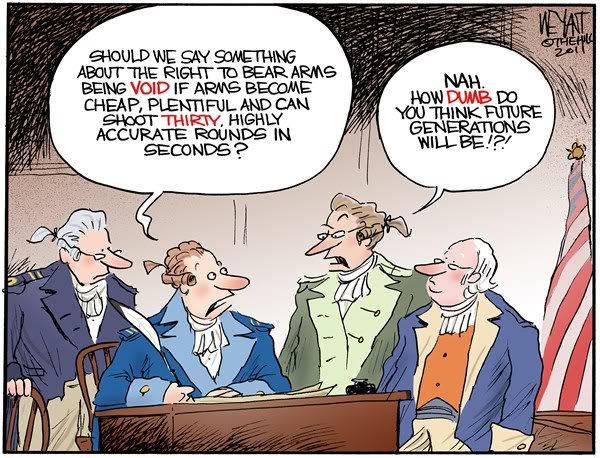
Clames
(2,038 posts)To do so is to elevate the Second Amendment above all other Constitutional Amendments and that just can't be right.
...it certainly isn't right to subordinate the Second Amendment to all other Constitutional Amendment.
As for your little cartoon...30 accurate rounds? What a crock of crap...
ellisonz
(27,776 posts)...instead of chopping off the words you don't like. ![]()
Have another:
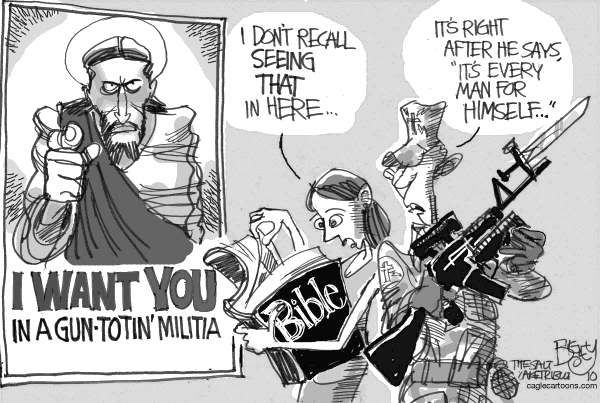
![]()
Clames
(2,038 posts)I just gloss over your whole spiel about the 2A being tied to militia service as you've beaten that horse to death, reanimated it, beat it again, then threw it in a wood chipper. I care not one whit how you think your interpretation of the 2A is the only correct interpretation. As for anyone one here even suggesting that individual right to bear arms denies anyone's safety (though your interpretation of the 9A needs some work), cite it.
You know, a picture is supposed to say a thousand words. Let's see you get to at least three with the next one...![]()
ellisonz
(27,776 posts)Okay - I've got dozens of these:
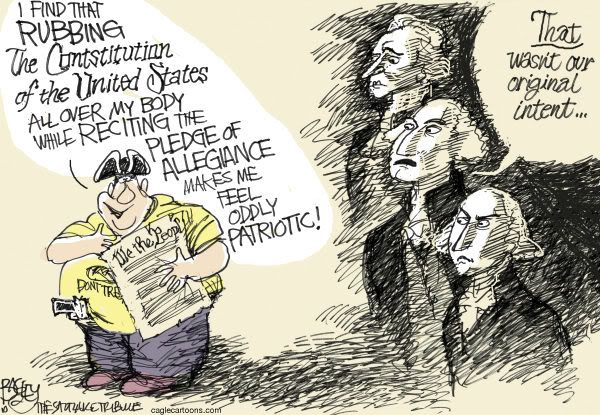
Keep trying.
ellisonz
(27,776 posts)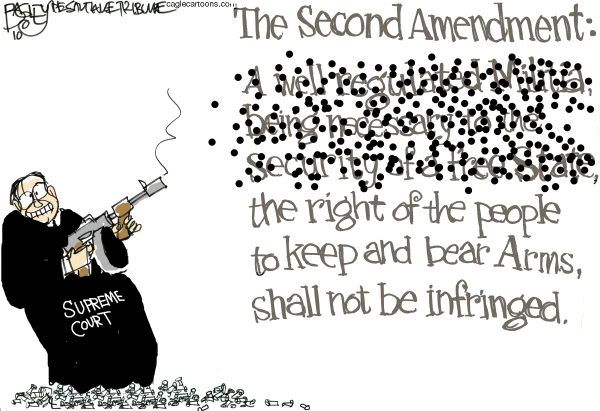
Clames
(2,038 posts)...but it still isn't saying very much. ![]()
oneshooter
(8,614 posts)ellisonz
(27,776 posts)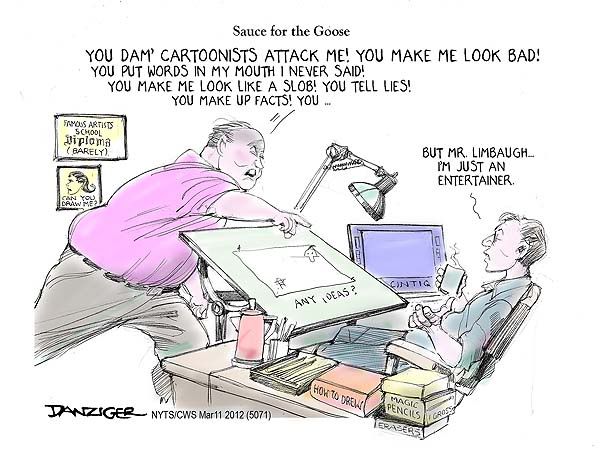
iverglas
(38,549 posts)Again, it dates from 1995, but it's quite interesting.
http://www.csc-scc.gc.ca/text/rsrch/briefs/b10/b10e-eng.shtml
The essential features of Antisocial Personality Disorder are a history of continuous and antisocial behavior through which the rights of others are violated, persistence into adult life of a pattern of antisocial behavior begun before the age of 15, and failure to sustain good job performance over a period of several years.
... According to the mental health survey conducted in 1988, robbery offenders, as a group, were also characterized by the relatively high lifetime prevalence of substance (more than two- thirds) and alcohol (about three-quarters) disorders among them. More recent data gathered on federal admissions has found that one-third of robbery offenders reported that they were under the influence of alcohol, drugs or both on the day they committed the offense(s).
Conclusion...
There are three key features of robbery offenders. First, robbery offenders possess attitudes, values and beliefs favorable towards violating the law. Second, robbery offenders often have and maintain supports for crime through friends and acquaintances. Thirdly, alcohol and/or drug abuse is a common characteristic of robbery offenders.
For robbery offenders, changing prociminal attitudes, reducing criminal associations and removing chemical dependencies are promising targets in prevention and rehabilitation.
But meanwhile, let 'em have guns ...
gejohnston
(17,502 posts)armed robbery is a violent crime
iverglas
(38,549 posts)Yes indeed it is.
It is a crime for which people, once convicted, often serve a custodial sentence and are then released on parole.
And there are those who are saying that when their parole ends, they have "paid their debt" and should automatically be entitled to possess firearms.
And I'm saying that is a bizarrely foolish agenda-driven position that totally fails to take into account the nature of the crime and of a majority of people who commit it.
gejohnston
(17,502 posts)the armed robber will be back in before his parole ends.
Atypical Liberal
(5,412 posts)The sad fact is that most people who commit homicide have extensive prior criminal backgrounds, including, on average, 4 felonies. These people are almost universally prohibited from owning firearms, but it doesn't stop them.
I like the idea of restoring rights after serving time in principle, but this is probably misplaced trust.
Maybe you should have to have a clean record for 5 years or something first.
